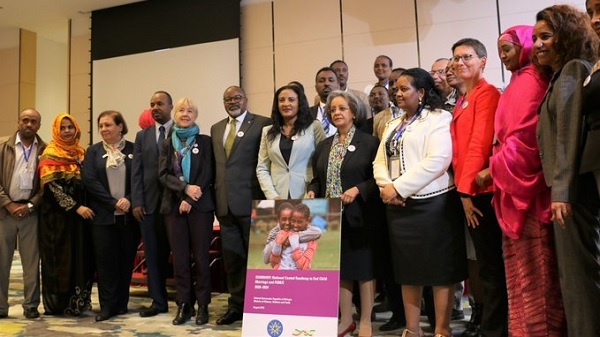
ADDIS ABABA (UNICEF Ethiopia) – The Government of Ethiopia has launched a five-year national roadmap to end child marriage and female genital mutilation (FGM). The plan, costed at US$ 94 million, outlines key strategies and interventions the Government and its partners intend to implement in order to achieve the ambitious national goal of eliminating these harmful practices by 2025.
The roadmap outlines five strategies for achieving elimination:
- Empowering adolescent girls and their families;
- Community engagement (including with faith and traditional leaders);
- Enhancing systems, accountability and services across sectors;
- Creating and strengthening an enabling environment; and
- Increasing data and evidence generation and use.
Funding for the roadmap will come from the government’s sectoral budgets, commitments from development partners, the private sector, and community-based initiatives.
“The will to end child marriage and female genital mutilation exists,” said President of Ethiopia H.E Sahle-Work Zewde. “I am delighted that we now have a plan which is a clear demonstration of the Government’s commitment to make harmful practices history in Ethiopia.”
UNICEF Representative Adele Khodr, also speaking on behalf of UNFPA and UN Women, lauded Ethiopia’s commitment to ending harmful practices and said no sustainable development could be achieved unless the situation of girls was improved. She called for accelerated progress.
“For Ethiopia to meet the Sustainable Development Goals of ending child marriage and FGM by 2030, the pace of progress it has made in the last ten years needs to be six times faster on child marriage and seven times faster on FGM,” she said.
The launch of the roadmap comes against a backdrop of steady progress in ending child marriage and FGM. The percentage of women aged 20-24 years who were married or in a union before the age of 18 declined from 60 per cent in 2005 to 40 per cent in 2016. Similarly, the prevalence of FGM among girls and women aged 15 to 49 years declined from 74 per cent in 2005 to 65 per cent in 2016
These rates of progress however mask regional variations. In the Afar Region, rates of child marriage and FGM have remained stagnant at about 67 per cent and 91 per cent respectively. Similar stagnation is observed in the Somali Region of Ethiopia where child marriage has remained at about 50 per cent for years and prevalence of FGM is nearly universal at 99 per cent.
In launching the roadmap for the period 2020-2024, the Government aims to accelerate progress towards its 2025 target set at the Girl Summit in London in 2014 as well as the Sustainable Development Goals. The roadmap includes costing at federal and regional levels that it is evidence-based and includes a monitoring and evaluation framework for tracking results. The roadmap was developed through a participatory process led by the Ministry of Women, Children, and Youth and involving the National Alliance to end child marriage and FGM and comprising government, UN agencies, non-governmental organizations and civil society.
Source: UNICEF Ethiopia
